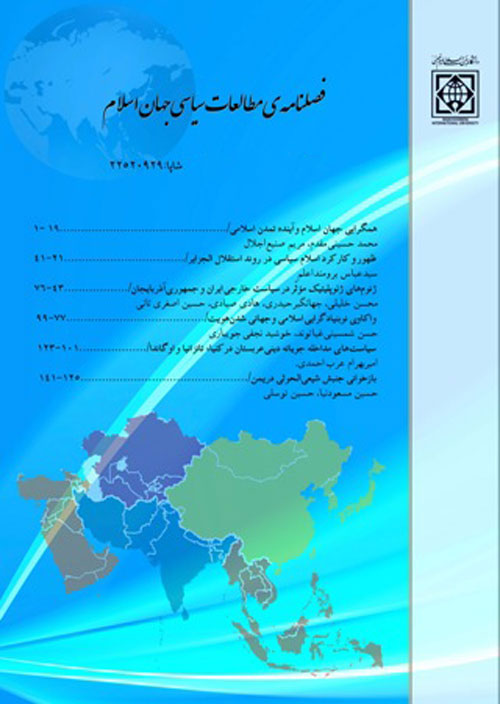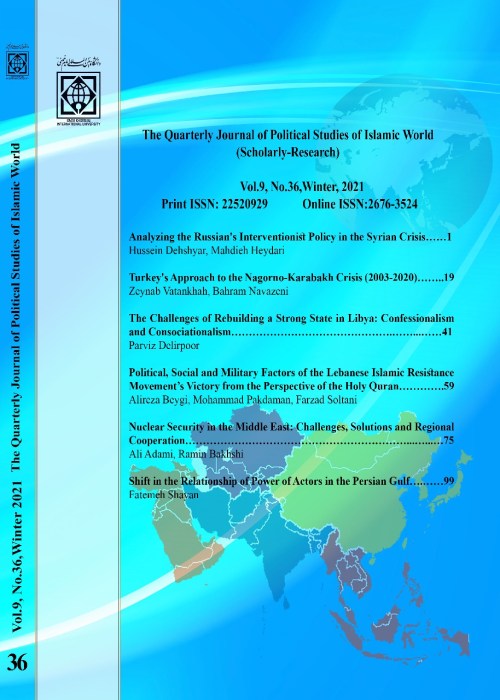فهرست مطالب

نشریه مطالعات سیاسی جهان اسلام
پیاپی 36 (زمستان 1399)
- تاریخ انتشار: 1399/12/11
- تعداد عناوین: 6
-
-
Pages 1-18PurposeThe main purpose of this article is to understand theinterventionist policy of Russia in the Syrian crisisMethodis an explanatory – description method and from the perspective of the Stanford School. So, the main question is “why did Russia use interventionist policy and violent behavior in the Syrian crisis?” The temporary hypothesis is that Russia, based on its threat perception to its important values, used the interventionist policy in the Syrian crisis. So, Russia's core values, based on the Stanford School, including: supporting of its strategic allay such as Iran, fighting with terrorist and take away from its back – yard and rising its bargaining power in the international system, these values deal with the actor's position and quality of life in the international system. Therefore, they fall into the category of important or secondary values than vital values.Resultby applying the Stanford School Model, this result has been concluded that there was a positive correlation between the Russian’s perception threat (stimulus) and its interventionist and violent behavior (response) in the Syrian crisis.FindingsAt least, findings of this article declared that Russian decision maker, by proper perception concerns and fears of environmental threats, could make balance of power in front of USA and its allies in negotiations table and in ground operations, freezed successfully the Islamic extremist in Syria and supported Iranian forces and their plans just due to its benefit and its interest both during the war and during the post war. In this article, the Russian threat perception is an independent variable of research, and use of interventionist behavior is the dependent variable of this research. Data collection and information methods are also based on library and Internet methods.Keywords: Threat perception, Russia, Syria, Stanford School, Response -Stimulus, Crisis management
-
Pages 19-39ObjectiveThe Nagorno-Karabakh conflict was one of the longest-standing international crises. It officially started on February 20, 1988, and not ended until Dec. 2020, when a cease-fire was signed and involved a military confrontation between Armenia and the Republic of Azerbaijan. The Republic of Azerbaijan, as the most important factor in the geopolitical region of the South Caucasus, after obtaining its independence faced the crisis ensued from the occupation of the land at the hands of Armenia. It later turned into an international crisis due to the intervention of some external powers. In the meantime, Turkey, as an ally of the Republic of Azerbaijan, has always tried to maintain its position among regional and trans-regional actors through its intervention in the Nagorno-Karabakh crisis. Therefore, the main purpose of the research is to explain Turkey's foreign policy approach toward the Nagorno-Karabakh crisis and likewise this article tries to focus on the developments of this approach during the governance period of the Justice and Development Party since 2003.MethodsThe method used in this study is descriptive - analytical based on the geopolitical theory and library resources.ResultAccording to the findings of this study, Turkey's foreign policy released it from unilateralism and one-way commitment and will run the fluidity as the strong factor in its foreign policy structure to supply its profits in Nagorno-Karabakh. In fact, Turkey benefits from the Nagorno-Karabakh, more than before now. It seems that Turkey has helped the situation in Nagorno-Karabakh radically changed in favour of Baku which in the long term is in its own favour.ConclusionThe results show that, by following the 'strategic depth' doctrine, influenced by the policy of détente of its neighbours and neo-Ottomanism, Turkey has followed the path of advocacy of Western policies toward independence and influence over the South Caucasus and Karabakh regions in pursuit of its national interests.Keywords: Turkey, South Caucasus, Nagorno-Karabakh crisis, the Justice, Development Party
-
Pages 41-58Objective
Eight years after Gaddafi's fall in 2011, Libya is still in deep internal disputes and does not have an integrated government and army to enforce national sovereignty. In addition to tribal affiliations and the region allegiances that provide fuel for the civil war, regional and global powers have also get involved in a proxy war, which in turn may also even lead to a global crisis by expanding its scope. In this context, the most important issue is the absence of a strong coherent government so question arises, given this social and political background, what are the challenges of rebuilding a strong government based on an appropriate constitutional model in Libya?
MethodsThis paper based on qualitative-descriptive framework aims to answer the challenges of state-building in Libya.
FindingsLibya is a heterogeneous territory characterized by distances, deserts and unequal distribution of resources, as well as tribal fractions. In some ways, the Libyan civil war is the result of Gaddafi's policies in undermining the institutions of the state, the army and the security apparatus. Also, lack of the proper social reforms and reliance on tribal allegiances have played a major role in continuing its tribal structure, now manifested in tribal, regional and political conflicts. Nevertheless, irredentism or separatism are not seen in Libya. Therefore, the prospect of peace and reconciliation improves.
ConclusionConsociationalism can provide a platform for reaching an agreement between the Libyan major political and regional actors. Consociationalism and Confessionalism are two patterns for conflict resolving in the ethnically fragmented communities. The article argues while Consociationalism can be an imperative theoretical basis for designing the new Libyan constitution, there is no need to resorting political confessionalism that has not a positive record in other Middle Eastern countries.
Keywords: Libya, State Failure, Civil War, Proxy War, Consociationalism, Confessionalism -
Pages 59-74Objective
The authors try to find out the main factors of Hezbollah’s victory based on the mentioned verse and analyze these factors. This paper tries to prove that Lebanon's Hezbollah, with the proper use of its limited facilities to meet the security, military and social objectives of all Lebanese people, was accepted by the people of Lebanon and then entered the political arena and achieved success.
MethodThe research method of the present article is descriptive-analytical in the framework of Holy Quran verses about the components of the victory of righteous and faithful tribes and faithful groups from the perspective of the Quran.
ResultsThe Islamic Resistance Movement of Lebanon, at the beginning of its establishment, was under intense pressure from the Lebanese government and international powers, in a way that the Shiite people were unable to meet their basic needs when the French forces were present in Lebanon. After a while, the situation changed.
ConclusionThe conclusion obtained from examining the performance of Hezbollah in Lebanon is that following the instructions and guidelines of the Qur'an and serving the people of the society will lead to the pleasure of God and will lead to victory.
Keywords: Islamic Resistance Movement, Hezbollah, Lebanon, Holy Qur'an, Israel -
Pages 75-97ObjectiveConsidering the fact that nuclear power technology and facilities have recently entered the Middle East, and that more reactors are to enter the area, this article analyzes issues relating to nuclear security challenges and the cooperation of countries in the region. This is vital for Middle Eastern governments who are seeking nuclear power to implement effective national policies in order for membership in international treaties and for joining international regimes. Using library resources, the present paper, seeks to respond appropriately to the main question: what are the core nuclear security challenges in the Middle East?MethodThis research uses descriptive-analytic methodology, and the data is collected from the library resources and documents.ResultsArticle findings show that nuclear security in the Middle East is confronted with the challenges posed by proliferation, increasing arsenals, expanding civilian nuclear programs, weakening nuclear export controls, domestic instability and terrorism in several Middle East countries.ConclusionThe scenario of Middle East becoming nuclear further strengthens its instability. The Middle East is at the crossroads of growing nuclear (military and civilian) nuclear programs and increased nuclear/radioactive security threats. Therefore, there is an indirect link between nuclear facilities and nuclear weapons that prevents nuclear security. The growing trend of nuclear power plants for civilian and military use has increased the efforts to manage nuclear and radioactive materials and prevent the spread of nuclear weapons.Keywords: Nuclear Energy, Nuclear Security, Middle East, Regional Cooperation, Challenges, Solutions
-
Pages 99-118ObjectiveThis article examines how has the Iraq War changed the balance of power and the relationship of power among the different actors in the Persian Gulf region? Different avenues of research have shed light on the relationship of power in the region among the regional states. However, this article explores the relationship between the Iraq War and the shift in the power of the states and transnational actors in the region.MethodMargaret Levi’s analytic narratives methodology (2002) is applied in this article to first, extract the actors, their goals, their preferences and the rules that influence their behavior. Second, a shift in equilibrium at one point in time that produces new outcomes at a different point of time is identified. Third, constraints and incentives by narrating the sequences and processes of events are explored.ResultsThe article explores: first, the period between 2000 and 2003, the three polarity powers of Iran, Iraq and Saudi Arabia were balanced by the United States (US). This is a continuation of the balance of power policy that dominated in the region during the past decades. Second, between 2004 and 2011, a security shift changed the distribution of power among the small and great regional states, the US and the transnational actors in the Persian Gulf.ConclusionThe findings, hence, indicate more heterogeneous and multi-angular actors are exercising power in the region, such as the small state of Qatar. The transnational actor, not only now exercises power in the region but they are also threatening regional states.Keywords: analytic narratives, Balance of Power, Distribution of Power, Iran, Pazhak, Transnational Actors, USA


